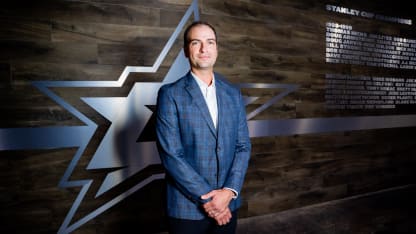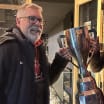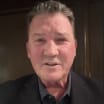In celebration of Hispanic Heritage Month from Sep. 15-Oct. 15, NHL.com will provide you with compelling stories around the Hispanic hockey community. From interviews with NHL players and hockey figures around the world, to local hockey initiatives and the growth of this beloved sport in the Hispanic community, NHL.com has you covered throughout the month.
Three years ago, Al Montoya began a different journey in the NHL.
After nine seasons in the League as a goalie, the 39-year-old has transitioned to the front office.
A Cuban-American, Montoya was hired by the Dallas Stars to foster the growth of hockey among underrepresented fans in the Metroplex area, particularly in Spanish-speaking communities. He started his role from scratch, and it has been evolving ever since.
Initially their director of community outreach, Montoya is the Stars vice president of cultural growth and strategy. The position has transformed, but its purpose remains the same.
“This evolution came out of the important work we were doing in the community,” Montoya told NHL.com/es. “The really intentional engagement started with our leadership. We have this fantastic sport, but gone are the days of people coming to us. We're much more in touch now to connect with the fans and the fanbases that we want to grow. We've been well-received in the community, building trust with community leaders and really connecting with the kids and youth of Dallas who really represent the future of Texas and the future of the Dallas Stars.
“So by providing this access and opportunity, we're also making sure that positions within the team are mindful of all of these external or underrepresented groups. Whether it's marketing, ticket sales, sponsorship or whatever, we're being mindful of the groups we want to connect with."
Montoya said under his management the Stars have established themselves as one of the NHL teams with the largest Hispanic fanbase. He hopes the numbers continue to increase not only with Dallas, but with every team in the League.
“We were at the NHL clubs’ business meetings in Los Angeles this past summer and they told us that there are four teams with over 1.4 million Hispanic fans, and the Dallas Stars are one of those clubs,” said Montoya, the No. 6 pick at the 2004 NHL Draft by the New York Rangers who went on to play 168 games with the Phoenix Coyotes, New York Islanders, Winnipeg Jets, Florida Panthers, Montreal Canadiens and Edmonton Oilers from 2009-18. “That doesn't exactly show you how we got here, but it sets the standard for where we are.
“I think being one of the top teams with a Hispanic fan base is a big deal. If we can get every team to over a million Hispanic fans, we’d have 30 million new Hispanics for hockey, and the game will continue to grow as we’re seeing.”
Montoya’s passion for promoting hockey among Hispanics goes beyond his work with the Stars. He recently represented the NHL at an annual Latino Action conference hosted by the U.S. Congressional Hispanic Caucus in Washington, where Vice President and presidential candidate Kamala Harris spoke.
Montoya was part of the panel called “Game Changers,” which focused on how to increase Latino leadership through sports. He said it was a great honor to be able to discuss the steps the League is taking to help the country's Hispanic community through sports.
“I spoke alongside Marisa Solis, who is the [senior vice president] of global brand at the NFL; Stacey DeArmas, who is the SVP at Nielsen; and MJ Acosta, who is talent at ESPN," Montoya said. "It was an opportunity to showcase what we’re doing in hockey and to connect. I talked about what it was like growing up playing hockey at a young age, breaking barriers and providing access. I mentioned the Fort DuPont Hockey Club in D.C., because we’re here locally, and how 150,000 kids have gone through their initiative, and the Hockey is for Everyone program.
“I also talked about the LATAM Amerigol tournament, how it went from six teams in 2018 to 50 teams in 17 countries this past August. It was an opportunity, in front of members of Congress, to talk about how we’re growing this sport and how the initiatives that the NHL supports are being intentional in that growth.”
Locally, one of the projects launched as part of the Stars' growth in the Hispanic community of the Metroplex is the Future Stars youth hockey program. It is a collaborative initiative between the team, the NHL and the NHL Players’ Association (NHLPA). Future Stars is present in more than 20 Dallas parks and in 11 local chapters of the Boys and Girls Club.
Hockey fans in Mexico also are on Montoya’s radar. He heads the Learn to Play program, which offers clinics to children in Mexico City. But Dallas does not want to limit its presence south of the border to just educational events.
“Our president, Brad Alberts, has already said that we want to be the first team to play in Mexico," Montoya said. "I say it all the time, but Mexican hockey is Dallas hockey, and Texas hockey is Mexico hockey. We're only separated by a border, that's all, so we're going to continue connecting with this community."
As for how quickly that dream of seeing the Stars playing in Mexico can be done, Montoya is unsure, but he said they will continue to strengthen ties with hockey fans south of the border.
“If it were up to me, it would be today,” Montoya said. “I know there are a lot of logistics and a lot of things that need to be organized. In the meantime, we will continue to connect, support and provide access where we can. I think that’s the most important thing.
“It’s not that hockey isn’t alive and present in the Hispanic community, it’s just that sometimes they need a little help, whether it’s providing ice time or, like last year, when we hosted seven youth teams from the Mexican Ice Hockey Federation to play in the Silver Stick tournament. It was the first time that happened. We also went to Mexico City this spring for a Learn to Play event. Hockey was alive and strong. It’s just that when you can combine an NHL team with the platform and strengths that we have to show that we’re here to help, that has a huge impact.”


















